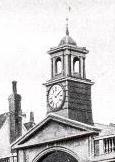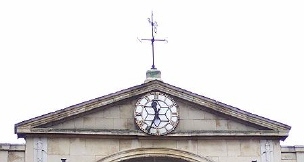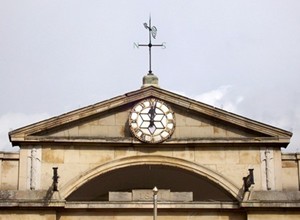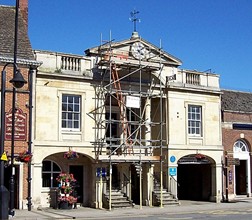|
The Town Hall clock
The tower and the clock on the Town Hall were financed by Mrs Eleanor Frances Pochin who died on 16th July 1823 at the age of 76. She was the widow of George Pochin, who was Lord of the Manor of Bourne Abbots for 37 years from 1761-98. The clock was made by Thwaite's & Reed, a distinguished firm of clockmakers established at Clerkenwell, London, during the 18th century, and remained in use until the end of the century when the parish council which was then responsible for administering local affairs, decided that the tower needed strengthening and that the clock should be illuminated at night. The project was the brainchild of Councillor Alfred Stubley, a local decorator and scenic artist, and it was mainly due to his practical knowledge and capability that it came to fruition. The work was carried out in 1899 by a local expert Mr Edward Pearce, a clock and watch maker with premises in North Street. The timepiece had been in need of restoration for some time and Mr Pearce fitted a new dial with gilded hands and black figures in an opal glass, allowing the clock face to be illuminated after dark, a modern innovation at that time. The illumination was provided by gas light regulated by automatic machinery and the old wooden turret or cupola was lined with asbestos to render it fireproof. The clock mechanism and pendulum were sited in the constable's room in the Town Hall below and connected to the dial by wires. Total cost of the work was £47 14s. 1d. [£4,000 at today's values]. "The illuminated dial of the clock gives universal satisfaction", said the Stamford Mercury. "The new clock is a decided improvement for which the parish councillors may justly claim credit." During the Great War of 1914-18, the
striking mechanism was silenced in case it might be confused with an air
raid or an invasion alert. The minutes of Bourne Urban District Council do
not say but merely recorded in April 1916: "In compliance with an order
from the Home Office, it was decided that the striker of the Town Hall
clock be tied up for the duration."
The clock continued in use until it was badly damaged during the Town Hall
fire of 1933 although, ironically, it would appear that
it was the gas lamp in the turret used to illuminate the dial that overheated and caused the
outbreak.
The tower was never replaced and the clock was later refurbished
and reinstalled on the pediment below where it can be seen today.
In March 2012, the clock stopped working with the hands stuck
at two minutes past twelve. A contractor was called in by South Kesteven
District Council which leases the Town Hall from Lincolnshire County Council
when it was discovered that the hands had been damaged, either by a bird
strike or perhaps by something being thrown at the dial. A report on the problem was sent to the original makers, Thwaite's
& Reed, seeking the cost of repairs but this was expected to be
expensive because scaffolding would be needed to reach the clock from the
front of the building and this was erected in July 2012 to enable the
contractors, Smiths of Derby, to carry out repairs.
The total cost was £2,293 which was paid by South Kesteven
District Council. The council leader, Linda Neal, (Bourne West), said: “The
clock is part of the history and fabric of Bourne and I am thrilled that we
have been able to repair it to ensure that it continues to run for generations
to come.”
REVISED JANUARY 2014 See also Town Hall clock to be restored
Return to The Town Hall
Go to: Main Index Villages Index
|
||||||||||




